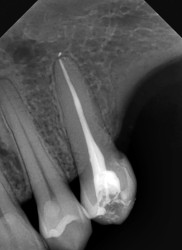Can Antibiotics Cure a Tooth (Root Canal) Infection?
Posted by Dental Didactics CE on Jul 12th 2022
How is a "Tooth Infection" a Root Canal Infection
There are several types of dental infections that can be successfully treated with antibiotics in conjunction with surgical procedures and other physical interventions. However, many patients are under the incorrect impression that "tooth infections" (which usually refers to an endodontic or "root canal" infection) can be adequately treated with antibiotics alone. A "tooth infection" that refers to an infection that is actually inside the tooth itself, when the pulp ("nerve") of the tooth becomes infected and disintegrates. This leaves the hollow area inside the tooth filled with bacterial toxins and pus which seep out the small holes at the end of the roots where blood vessels and nerves enter the tooth. As toxins from this reservoir of infection seep out the root ends they cause infection and swelling in the bone adjacent to the tooth.
Why Antibiotics Can't Cure a Root Canal Infection
At this point, if antibiotics are prescribed they will enter the blood stream and be delivered to the bone around the infected tooth and cause the infection in the bone to subside temporarily. This gives patients the incorrect impression that the antibiotics have "cured" the infection. Unfortunately, antibiotics are only effective against bacteria in areas where they can be delivered by the blood stream. In this case, the antibiotics have treated the infected bone and gums surrounding the tooth, which results in the resolution of pain and swelling. However, the infection inside the tooth has been untouched, as the circulatory system (blood vessels) in the interior of the tooth have been destroyed and are unable to deliver antibiotics. The tooth infection itself has remained untreated, despite the swelling and pain being temporarily resolved. Once the patient stops taking their antibiotics, the bacterial infection which is still active inside the tooth begins to force toxins back out into the bone where it infects the bone again, perpetuating a vicious cycle of reinfection. Antibiotics just cannot definitively eliminate a tooth infection inside the tooth. Additionally, antibiotics should not be prescribed for infections that will just return as soon as the antibiotics are out of the patient's system as multiple courses of antibiotics can cause dangerous long-term side effects of Antibiotic Resistance.
An internal tooth infection can only be definitively treated by physically opening up the tooth, flushing out the bacteria and toxins, then disinfecting the hollow interior of the tooth and filling it with a biocompatible sealer to prevent bacteria from re-entering the tooth. That procedure is termed a "root canal" and a new and effective antibacterial sealer that has been developed for this purpose is MTA . Patients should be aware that taking extended courses of antibiotics to treat a tooth infection will never successfully treat a "root canal" problem, and carries with it significant negative potential side effects.

